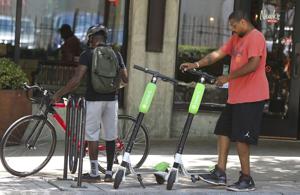State budget OKs Pittsburgh’s scooter share pilot program

(The Center Square) – Pittsburgh’s scooter share project got the green light from legislators after language authorizing the city’s pilot program wound up in the annual state budget approved last week.
KDKA first noticed a collection of public electric scooters, manufactured by a Ford-owned company named Spin, downtown last November. But city officials couldn’t move forward with their plan until the Pennsylvania Department of Transportation OK’d scooters for use on public roads.
Senate Minority Leader Jay Costa, D-Pittsburgh, and Sen. Wayne Langerholc Jr., R-Clearfield, sponsored Senate Bill 783 earlier this month that would have established the program as a part of Pittsburgh’s Mobility Collective, a city-led initiative that streamlines transportation services for residents, including car shares, e-scooters, carpool, bike shares and public transit.
Molly Onufer, a spokesperson for the mayor’s office, said more information about the program will be released next week.
In a cosponsorship memo, the senators said the pilot program, if successful, would require follow up legislation to expand the program statewide. SB 783’s language was inserted into the Fiscal Code as part of the package of bills passed in conjunction with the $40.8 billion annual budget.
Langerholc told The Center Square that the bipartisan program provided an opportunity too good to ignore.
“People don’t realize Pittsburgh is the hub that it is for technology and emerging industries,” he said. “This was a good opportunity to get out in front of something that would beneficial for the state.”
In an interview with TechCrunch, Spin’s new CEO, Ben Bear, said the company began targeting mid-tier cities that were looking to expand public transit options, including Grand Rapids, Michigan. City officials in Bakersfield, California, likewise offered the company a $1.1 million grant to install the necessary infrastructure for its e-scooters and bike shares, according to the report.
“We definitely see ourselves as part of that broader ecosystem, which includes public transit,” Bear said.
The company hopes to grow its profitability and soar past its competitors, Lime and Bird, by securing exclusive contracts with cities based on its compliance record.
The California-based Lime and Bird, the country’s largest e-scooter companies, each face mass tort lawsuits for allegedly failing to maintain their equipment, resulting in more than 90 injuries among users.
The Washington Post reports that some riders suffered broken bones requiring surgery after the scooters’ breaks failed or the throttles malfunctioned.
Disclaimer: This content is distributed by The Center Square
